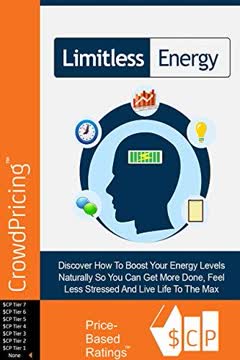Key Takeaways
1. Recognize the Signs of Low Energy and Its Impact on Quality of Life
Remember that little kid version of you who used to run around the house all day? That's what great energy should look like!
Chronic low energy is pervasive. Nearly half of adults report feeling stressed every day, leading to adrenal fatigue and decreased energy levels. Low testosterone in men, vitamin deficiencies, and poor lifestyle habits contribute to this widespread issue.
Signs of low energy include:
- Difficulty waking up in the morning
- Emotional exhaustion and decreased motivation
- Struggles with focus and productivity
- Neglected household chores
- Lack of interest in social activities
- Inability to commit to healthy habits
Recognizing these signs is crucial for taking action to improve energy levels and overall quality of life.
2. Optimize Your Diet for Sustained Energy Levels
Our Low Density, Simple Carb Diets
Simple carbs are energy zappers. Many people rely on processed, high-calorie foods that provide quick energy but lead to crashes and fatigue. These foods spike blood sugar, causing insulin surges and subsequent energy slumps.
The ideal energy-boosting diet includes:
- Complex carbohydrates (brown rice, whole grains)
- Lean proteins
- Healthy fats
- Fresh fruits and vegetables
Focus on nutrient-dense, unprocessed foods to provide sustained energy throughout the day. Avoid overeating, as digesting large meals can drain energy. Instead, opt for smaller, more frequent meals to maintain steady energy levels.
3. Harness the Power of Supplements to Boost Energy
Eating a healthy diet is like having an incredibly expensive athlete's supplement stack! Only delicious.
Strategic supplementation can jumpstart energy levels. While a balanced diet is ideal, supplements can help fill nutritional gaps and provide an energy boost.
Key energy-boosting supplements include:
- Vitamin D: Improves sleep and testosterone production
- Iron and Vitamin B12: Essential for healthy red blood cells
- Coconut Oil: Contains medium-chain triglycerides for alternative energy
- Omega 3 Fatty Acids: Enhances cell communication
- Creatine: Improves ATP recycling for increased energy
- Coenzyme Q10: Enhances mitochondrial efficiency
Remember, supplements should complement, not replace, a healthy diet. Consult with a healthcare professional before starting any new supplement regimen.
4. Transform Lifestyle Habits to Enhance Energy
Too bad then that the majority of the US population are chronically dehydrated!
Hydration is crucial for energy. Dehydration leads to fatigue, headaches, and decreased cognitive function. Aim to drink 7-10 glasses of water daily to maintain optimal hydration and energy levels.
Other energy-enhancing lifestyle changes:
- Reduce alcohol consumption: It disrupts sleep and depletes energy
- Minimize prolonged sitting: Take regular breaks to move and stretch
- Manage stress: Practice relaxation techniques and seek support when needed
- Create a balanced work environment: Ensure proper posture and ergonomics
Implementing these habits can significantly improve overall energy levels and well-being.
5. Prioritize Quality Sleep for Optimal Energy Restoration
Getting the right sleep and you will perform on the top of your game the next day it's that simple.
Sleep is the foundation of energy. Poor sleep quality or quantity can drastically impact daily energy levels, mood, and cognitive function.
Tips for improving sleep quality:
- Maintain a consistent sleep schedule
- Create a dark, quiet, and cool sleeping environment
- Avoid screens before bedtime
- Take a hot bath or shower before sleep
- Practice relaxation techniques to calm the mind
For those who struggle with falling asleep, focus on relaxation rather than forcing sleep. This mindset shift can paradoxically lead to faster and better-quality sleep.
6. Craft an Energizing Morning Routine
A cold shower will not only shock you into wakefulness, it will actually trigger the release of norepinephrine and dopamine thus making you more alert and even speed up your metabolism to burn more fat.
A strategic morning routine sets the tone for the day. How you start your morning can significantly impact your energy levels throughout the day.
Elements of an energizing morning routine:
- Gradual wake-up: Use a daylight lamp or sleep cycle alarm
- Hydrate: Drink a large glass of water upon waking
- Cold shower: Boost alertness and metabolism
- Nutritious breakfast: Fuel your body with protein and complex carbs
- Light exercise: Get your blood flowing with stretching or a brief workout
Customize your routine to fit your schedule and preferences, focusing on activities that leave you feeling energized and ready to tackle the day.
7. Leverage Exercise to Amplify Energy Levels
Exercise increases the quantity and efficiency of mitochondria and especially when you use HIIT.
Regular exercise boosts energy in multiple ways. It improves cardiovascular health, increases mitochondrial function, and releases mood-enhancing endorphins.
Effective energy-boosting exercise strategies:
- High-Intensity Interval Training (HIIT): Efficient for improving mitochondrial function
- Strength training: Builds muscle and improves overall stamina
- Outdoor activities: Combine exercise with fresh air and natural light
- Consistent routine: Regular exercise yields long-term energy benefits
Balance is key – avoid overtraining, which can lead to fatigue and burnout. Listen to your body and adjust your routine as needed.
8. Align Your Work Schedule with Natural Energy Cycles
Your energy levels ebb and flow like waves and at some points you are going to be high in energy and at other points you are going to be low in energy.
Work with your body's natural rhythms. Energy levels fluctuate throughout the day, influenced by internal body clocks and external factors.
Typical energy cycle:
- Morning: High energy after waking
- Mid-day: Steady energy
- Early afternoon: Post-lunch dip
- Late afternoon: Low point (around 4 PM)
- Evening: Gradual decline
Structure your workday to align with these natural cycles. Tackle complex tasks during high-energy periods and schedule less demanding activities for low-energy times. Be mindful of meal timing and its impact on energy levels. By working with your body's natural rhythms, you can optimize productivity and maintain consistent energy throughout the day.
Last updated:
Download PDF
Download EPUB
.epub digital book format is ideal for reading ebooks on phones, tablets, and e-readers.






